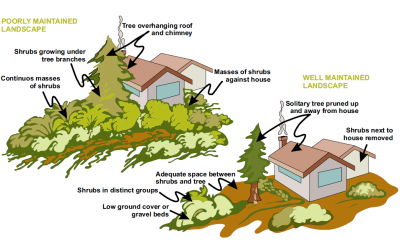Wildfire Prevention and Fire Safety
While communities on the western side of the Cascade Mountains have enjoyed historically low wildfire risk and smaller, slow-moving fires, it is important to understand that wildfires can occur anywhere and any time throughout the year. Wildfire potential is always higher during periods with little or no rainfall, which make brush, grass, and trees dry and burn more easily.
Protecting yourself today means having sources for information, preparing your home or workplace, developing an emergency communications plan, and knowing what to do when a wildfire is approaching your home or community.
On this page, you will find information to help keep you, your family, and the community safe. Continue reading or click the following links to jump to each section.
- General Prevention and Fire Safety Tips
- Creating Defensible Space
- Fire Prevention in the Home and Emergency Preparedness Tips
- Fire Prevention in Mercer Island Parks and Openspace
- Fire Prevention on the Road
General Prevention and Fire Safety Tips
Early detection of a fire, and early notification to the Fire Department is key!
- Call the Fire Department to check out an area, or small fire. We would rather respond to small fires, or suspected fires, rather than large ones.
- Improper disposal of ashes, charcoal, and smoking debris accounts for a large number of fires.
- Make sure that the debris is completely extinguished.
- Place in metal container away from the house and soak with water.
- Do not place ashes or charcoal in rock areas, greenbelts, or in a area where the wind could blow ashes around.
- Bark fires can start by spontaneous combustion related to the decomposition of the material. If you have large amounts, rake often and keep moist.
- Some glass yard ornaments have been blamed for starting fires… much like magnifying glass to wood.
- During warm, dry seasons, have hoses ready in case something does accidently start.
- Sign up to receive alerts via Mercer Island's Emergency Alert System.
- Any questions can always be directed to the Fire Department. We are happy to assist!
Defensible space is essential to improve your home’s chance of surviving a wildfire. It’s the buffer you create between a building on your property and the grass, trees, shrubs, or any wildland area that surround it. This space is needed to slow or stop the spread of wildfire and it protects your home from catching fire – either from direct flame contact or radiant heat. Defensible space is also important for the protection of the firefighters defending your home.
- Remove long grass, weeds or anything that can burn from around homes.
- Remove limbs that touch buildings or hang near the roof.
- Remove dead plants or bushes as soon as possible and clear roof and gutters of pine needles and leaves.
- Move trash, recycling, and yard waste bins away from the home.
- Be aware that sparks from lawn mowers can start fires, so avoid mowing when its dry or windy. Keep your yard green if you can and when it’s safe to mow, mow it down to the lowest level that your lawn mower will allow.
- Know where you fire extinguisher is and how to operate it. Make sure that it is not expired. This occurs usually around 5 years.
- Check your smoke detector batteries every 6 months or install a 10 lithium battery. If your smoke detectors are older than 10 years old, they have exceeded their useful life. Replace them.
- If you have a fire sprinkler system or required fire alarm system, make sure it is annually serviced by a Fire Protection Company.
- Know your exit plan and practice it… really practice. Children need to know where to go and never to reenter the structure for any reason if there is a fire.
- Make a meeting place.
- Have more than two exit routes.
- If you are using candles make sure they are on non-combustible surfaces or in non-combustible containers. Keep away from areas prone to being knocked over. Extinguish when not home.
- Never put a grease fire out with water!
- Watch out for overloading electrical outlets. Use multi-plug power strips with circuit breakers installed only.
Fire Prevention in Mercer Island Parks and Openspace
- Parks forests managed by ecologists and arborists on staff.
- Woody debris plays an important role in ecological health of PNW forests.
- Decomposing wood supports plant, animal, and insect populations, and can help forests retain moisture during dry season.
- To reduce fire risk, park visitors should:
- Extinguish cigarettes completely, put in garbage cans
- Never ignite fireworks and sparklers
- Dispose of BBQ ashes in designated ash cans
- Park in designated paved/gravel areas, never on vegetation
- Vehicles should park on pavement or gravel without vegetation. Numerous fires start from heat produced by hot metal underneath vehicles.
- A large amount of roadway fires occur from dragging trailer chains or vehicle brakes. Make sure that your vehicle brakes are checked is squeaking or in need of repair. Secure chains so they do not drag on the pavement.
- Check your tire pressure before driving. Exposed rims can create and throw sparks.
Note: All recreational fires (the only type allowed on Mercer Island) require a permit from the Fire Marshals Office- free permit. The permit outlines the specifics of the fire. These include location from buildings, lot lines and trees, size, and precautions the owner must take.
More wildfire safety tips and information is avaialble at America's PrepareAThon: How to Prepare for a Wildfire

